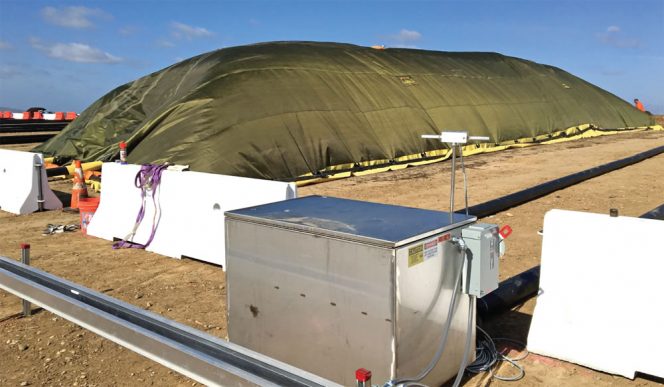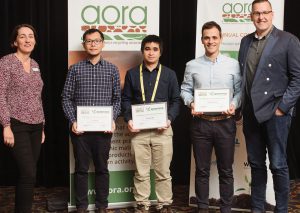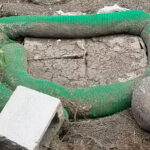BioCycle July 2019
San Diego, California: New Composting System At Miramar Greenery
The City of San Diego has begun composting food waste and yard trimmings at the Miramar Greenery landfill using Sustainable Generation SG Mobile™ Systems with GORE® Covers. At capacity, the operation will compost 40,000 tons/year of food waste and yard trimmings. Currently in the start-up phase, the project is expected to begin operating at full-scale during the third quarter of 2019. A pilot study performed in 2009 demonstrated the two feedstock streams can be composted successfully via the covered aerated static pile method atop a landfill, while maintaining reduction of odors, VOC emissions and the potential for leachate water.
The City received a $3 million grant from CalRecycle for the project in 2017. SCS Engineers provided design-build services. The project is also debuting an all-electric cover winder machine — the first time Sustainable Generation has delivered such a unit. Previous winders were diesel or gas powered.
Perth, Australia: Inaugural AORA Student Research Awards
The inaugural AORA Student Research Awards were given out at the annual National Conference of the Australian Organics Recycling Association (AORA), recently held in Perth. The awards were sponsored by Komptech. The Centre for Recycling of Organic Waste and Nutrients at the University of Queensland managed the call for nominations and the independent selection process, which involved members of the organics recycling and agricultural industries, government bodies, and academia. The awards were open to persons who had successfully completed postgraduate work at Honors, Masters or PhD levels during 2018. Their work must have advanced organics recycling activities and supply chains for source separated urban derived organic materials, food and fiber processing residues, biosolids, and also agricultural residues such as animal manures and mortalities. Top ranked candidates were given an opportunity to present their work at the conference, and rewarded with checks worth $2,000 (Honors), $4,000 (Masters) or $6,000 (PhD).
Dr. Daniele De Rosa won the PhD category for his work that sought to optimize use of organic amendments in subtropical vegetable cropping systems for improved environmental and agronomic outcomes. His research demonstrated the agronomic, environmental and economic benefits of integrating raw and composted organic soil amendments with reduced N, P and K -fertilizer rates in intensively cultivated soils. Dr. Shao Yap was second winner in the PhD category for work that assessed options of developing a low-cost leach bed anaerobic digester suitable for processing high solids waste such as animal manure and bedding that can be built and operated cost-effectively at farm level. Aidan Chin demonstrated how sorbents can tailor nitrogen release from organic soil amendments to better match the uptake capacity of crops, winning the Honors category. He explored methodologies for evaluating sorbents as additives to agricultural organic residues to temporarily retain nitrogen, mainly ammonium (NH4+) in an exchangeable form and subsequently release it at rates that approximate the uptake capacity of roots.
Sacramento, California: Healthy Soils Grants Awarded
The California Department of Food and Agriculture (CDFA) awarded grant funding to 217 projects through its Healthy Soils Program, totaling approximately $12.48 million. The program encourages farmers and ranchers to implement practices that reduce atmospheric greenhouse gases, sequester carbon in soils and improve soil health. The funding is distributed between direct farmer incentives and on-farm demonstration projects; both programs promote widespread adoption of conservation management practices statewide. CDFA has selected 194 projects across 45 counties for the Incentives Program, and 23 projects across 16 counties for the Demonstration Program. Projects will implement practices including, but not limited, to compost application, cover crops, reduced or no-tillage, and establishment of permanent woody or herbaceous cover on California’s farm and ranch lands.
The Healthy Soils Program was established as part of the California Healthy Soils Initiative, a collaboration between state agencies to support the development of healthy soils in California. The program is funded through the California Climate Investments and the California Drought, Water, Parks, Climate, Coastal Protection, and Outdoor Access for All Act of 2018.
Denver, Colorado: Composting In America
A new report released by U.S. PIRG Education Fund, “Composting In America: A Path to Eliminate Waste, Revitalize Soil and Tackle Global Warming,” brings a new voice to compost advocacy. The report highlights best practices to guide communities on how to “launch successful composting programs that reduce waste, contribute to a sustainable food system, help tackle global warming, and reduce harmful air and water pollution.” Composting In America includes policy recommendations — ones many of us are familiar with but are always worth advocating — that can help accelerate the infrastructure development process:
• Require commercial producers of organic waste to divert it to composting facilities.
• Require government projects to use compost
• Incentivize backyard and community composting
• Federal and state government subsidies for creation of composting facilities and programs through grants, loans and other financial mechanisms
• Fund programs to develop and test municipal composting programs
Ocala, Florida: Researchers Study Use Of Compost To Reduce Water Usage
The University of Florida Institute of Food and Agricultural Sciences researchers are studying whether compost use on residential lawns can help reduce the amount of water needed for healthy soil. The team’s preliminary research shows the amount of water used on these lawns, known as irrigation rates, can be reduced by 25 percent or more if compost is added instead of only having low quality soil, said A.J. Reisinger, a researcher on the team. The first study is taking place in Ocala’s On Top of the World retirement community, where researchers are adding compost to lawns before constructing additional homes. Researchers plan on testing the long-term effects of compost in other areas, particularly in Central and Northeast Florida.
Phillip Hisey, director of landscape operations for On Top of the World, reports he is seeing the grass grow more quickly without any damage to the soil. Because the progress has been so great, he said the community is making investments to buy equipment to apply compost to every new yard.
Dover, Delaware: State And Composter Settle Permit Violations
Delaware’s Department of Natural Resources and Environmental Control (DNREC) and Perdue AgriRecycle, LLC (Perdue) have entered into a settlement agreement that resolves environmental violations arising from operations under Composting Permit SW-18/03, DNREC Secretary Shawn M. Garvin announced in early June. Under this permit, Perdue operates a composting facility in Seaford using agricultural wastes and residues from its poultry operations as feedstock for the company’s compost production.
Perdue’s permit requires quarterly reporting of analytical testing of compost batches to ensure that it is fit to be sold. Issues arose from lab reports being provided in a piecemeal manner to DNREC. Additionally, the reports were missing key data points, and DNREC’s Division of Waste & Hazardous Substances questioned the compost batch samples and their chain-of-custody. Chain-of-custody helps to make sure a sample is handled in such a way as to maintain quality control and prevents introducing potential contamination into the process of moving the sample from the field to the lab.
The settlement agreement directs Perdue to change how they are reporting as well as to clarify how reports will be provided to DNREC. Additionally, it focuses on ensuring that the quality of finished product is high and conforms to the standards within Permit SW-18/03 and that “unfinished” product will no longer be distributed by Perdue AgriRecycle, LLC.
Honolulu, Hawaii: Compost Reimbursement Program
Following enactment of Act 89 in 2018, the Hawaii Department of Agriculture (HDOA) established the Compost Reimbursement Program, which reimburses agricultural producers for the cost of purchasing compost. Act 89 allocated $650,000 over a two-year period for the reimbursement of 50 percent of compost cost incurred by agricultural producers during fiscal year 2019 (July 1, 2018 to June 30, 2019) and a portion of fiscal year 2020 (July 1, 2019 to March 30, 2020) not to exceed $50,000/applicant/year. Monies for the remainder of the three-year program have not yet been appropriated by the legislature.
Under the reimbursement program, compost must be purchased from a certified processor, retailer or wholesaler licensed to do business in Hawaii. In addition, certified Hawaii processors are limited to those companies regulated under the Hawaii Department of Health’s Solid Waste Management Program.















